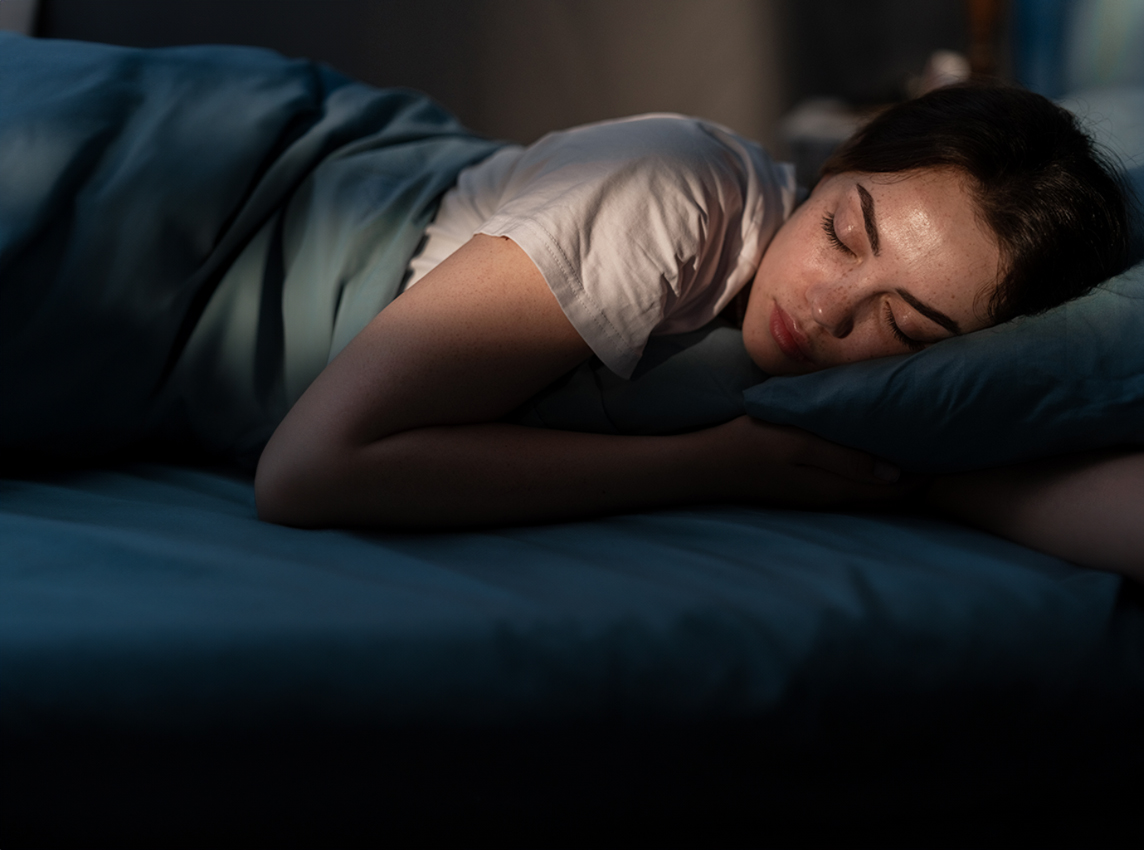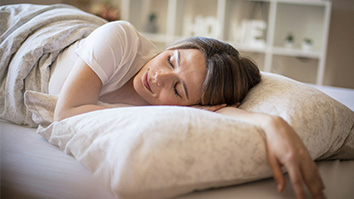
human sleep program
Driving innovation in sleep research
The Human Sleep Research Program is recognized for its dual expertise in conducting basic/clinical research studies as well as applied research and development (R&D) commercial work in the sleep tech space.
Real-world impact
-

SRI sleep expert Fiona Baker discusses menopausal insomnia
Researchers study how menopause can affect sleep and women’s physical and mental health.
-

SRI and Lisa Health reveal new research on menopause in the workplace
International Women’s Day brings broad awareness to the need for inclusive and effective programs.
-

Exploring the deep connections between adolescent sleep and overall health
Fiona Baker of SRI’s Human Sleep Lab discusses how good sleep patterns are critical for brain development in our early years.
Basic and clinical science
Our work includes several National Institutes of Health (NIH)-sponsored studies. We are investigating psychophysiological mechanisms underlying insomnia pathophysiology in adolescents and mid-life women using interventional and observational designs. Other areas of interest include:
- Developmental changes in sleep and brain structure and function across adolescence
- Links between sleep and memory in women
- The impact of pre-sleep psychophysiological manipulations (e.g., stress, alcohol intake) on sleep and cardiovascular regulation during sleep.
We use a wide range of innovative techniques including EEG, impedance technology, MRI and beat-to-beat blood pressure monitoring to gather physiological data which is further analyzed using sophisticated analytical techniques. These data are frequently combined with clinical and behavioral neuropsychological data.
Applied science and sleep technology
The Translational Sleep Technology Unit of the Human Sleep Research Program focuses on advancing science while also discovering and developing novel approaches and technologies to improve people’s sleep health and well-being. We also conduct validation and product development studies for commercial clients, particularly in the wearable technology space.
Basic science & consortium studies grants
The Human Sleep Research Lab has a diverse portfolio of research and clinical NIH-funded studies.
Commercial projects
The Human Sleep Lab has experience and expertise in sleep technology development and testing. Our sophisticated facility is equipped with state-of-the-art lab equipment capable of collecting a broad range of psychophysiological data on healthy sleepers and pathological sleep conditions. We have access to an onsite institutional review board (IRB) and have experience in developing protocols for R&D projects as well as clinical trials. We have worked with various commercial clients to validate, develop, and test investigational devices within the sleep technology space.
In addition, our team has a unique capability in testing the performance of novel sleep-tracking technologies — e.g., wearable sleep trackers such as smart multi-sensors wristbands — to assess sleep and other physiological signals against gold standard lab polysomnography, research, and clinical-grade equipment.
Recent publications
-
Deficiency of orexin signaling during sleep is involved in abnormal REM sleep architecture in narcolepsy
Here, we determined the activity dynamics of orexin neurons during sleep that suppress the abnormal REM sleep architecture of narcolepsy.
-
Identification and characterization of screen use trajectories from late childhood to adolescence in a US-population based cohort study
This study will identify and characterize the subgroups of adolescents sharing similar trajectories of screen use from childhood to adolescence.
-
Associations between alcohol use and sex-specific maturation of subcortical gray matter morphometry from adolescence to adulthood: Replication across two longitudinal samples
This project used generalized additive mixed models to examine sex-specific development of subcortical volumes and associations with recent alcohol use…
-
Higher blood pressure and weight observed among early adolescents during the COVID-19 pandemic
The aim of this study is to quantify differences in blood pressure and weight before and during the COVID-19 pandemic among a demographically diverse national sample of early adolescents.
-
The Menstrual Cycle and Sleep
Although objective sleep continuity remains unchanged across the regular, asymptomatic menstrual cycle, activity in the sleep electroencephalogram varies.
-
Evaluation of a device-agnostic approach to predict sleep from raw accelerometry data collected by Apple Watch Series 7, Garmin Vivoactive 4, and ActiGraph GT9X Link in children with sleep disruptions
This study demonstrates that raw acceleration data from consumer wearable devices has the potential to be harnessed to predict sleep in children.
Our experts in human sleep research
-

Fiona C. Baker
Director of Center for Health Sciences and Human Sleep Research Program, Biosciences Division
-

Dilara Yüksel
Research Scientist SRI International, Human Sleep Research Program
-

Simone Behar-Seilo
Clinical Psychologist, Human Sleep Research Program
-

Eva M Müller-Oehring
Senior Research Scientist, Human Sleep Research Program
-

Orsolya Kiss
Research Scientist, Human Sleep Research Program
-

Marie Gombert
Postdoctoral Fellow, Human Sleep Research Program